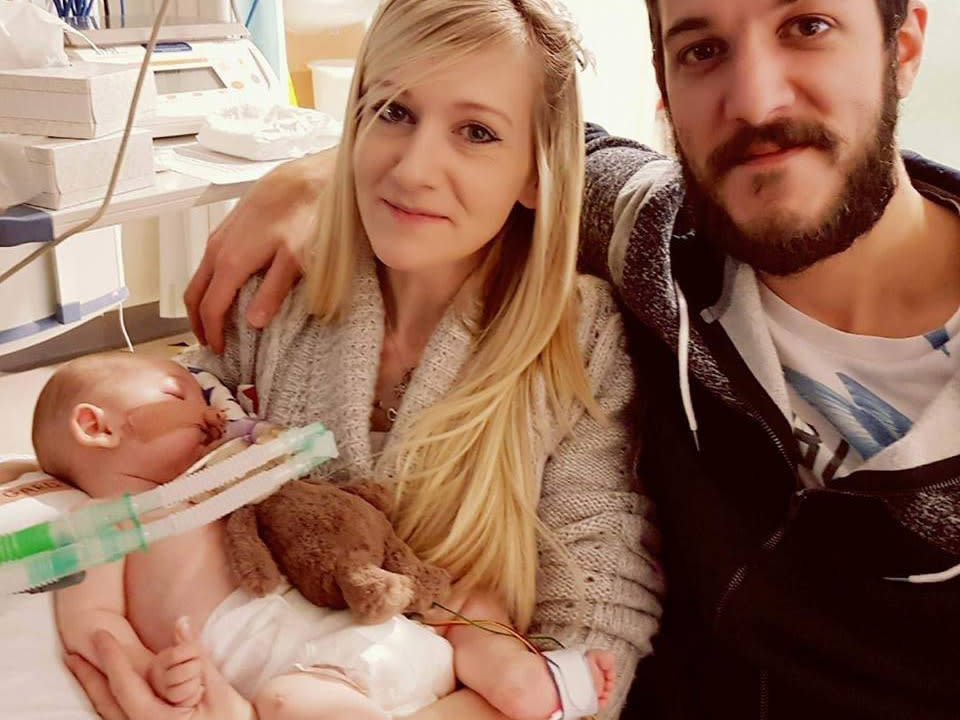Charlie Gard: Terminally ill baby's parents say he 'deserves a chance' at Great Ormond Street Hospital protest

The mother of terminally-ill baby Charlie Gard has asked Great Ormond Street Hospital (GOSH) to let him go to the US for experimental treatment, saying: “There’s nothing to lose, he deserves a chance.”
Connie Yates was speaking at a protest outside a London hospital, where supporters were delivering a petition of more than 350,000 signatures, calling for the 11-month-old to travel to the US.
Along with Charlie’s father Chris Gard, she had earlier vowed that the fight for their baby to receive experimental treatment was “not over”.
In a series of posts on the @charliesfight Twitter account, the family thanked supporters for sharing their son’s story across the world.
Charlie has a rare genetic disorder that causes brain damage and prevents muscles from developing.
His parents, both in their 30s and from Bedfont, west London, want to take their son to a hospital in the US for experimental therapy they believe could prolong and improve his life.
But they lost a lengthy legal battle after successive judges ruled in favour of doctors at GOSH, who argued the treatment would not improve the infant’s quality of life and say his life-support machine should be switched off.
A hugely emotional public debate has raged worldwide over Charlie’s case, with US President Donald Trump and Pope Francis both wading in.
The @charliesfight account, run by family members, tweeted: “A HUGE thank you to all you out there supporting and sharing Charlie’s story! Please keep going! The fight is not over!”
Supporters are to stage a rally near to the hospital on Sunday afternoon after delivering the petition.
Charlie’s parents have spoken to the father of Ashya King, a young cancer patient whose parents took him out of hospital and abroad for proton beam therapy not offered on the NHS, The Sun reported.
Brett King, 54, accused GOSH doctors of making a “boardroom decision” on Charlie’s case and told the paper: “There’s no logic in refusing them.”
But GOSH said its doctors believed the treatment would be “futile” and could prolong the boy’s suffering.
A HUGE thank you to all you out there supporting and sharing Charlie's story!please keep going!the fight is not over!!!! #charliegard
— Charlie's Fight (@charliesfight) July 8, 2017
Charlie’s family were joined by an American pastor who travelled to the UK to pray at his bedside and tweets from the campaign account suggested he had initially not been allowed on the neonatal intensive care unit, which cares for seriously ill infants.
But Patrick Mahoney, a pastor at the Church on the Hill in Washington DC, later said he had been able to pray “for a miracle” alongside the parents.
It comes after GOSH said last week that it had applied to the High Court for a fresh hearing “in light of claims of new evidence relating to potential treatment for his condition”.
The decision was prompted by claims of “new information” from researchers at the Vatican’s children’s hospital.
Clinicians from the Bambino Gesu paediatric hospital’s neuroscience department said tests in mice and patients with a similar, but not the same, genetic condition as Charlie had shown “dramatic clinical improvements”.
Charlie inherited the faulty RRM2B gene from his parents, affecting the cells responsible for energy production and respiration and leaving him unable to move or breathe without a ventilator. The therapy is not a cure for the condition.
GOSH describes experimental nucleoside therapies as “unjustified” but its decision comes after two international hospitals and their researchers contacted them “as late as the last 24 hours” to say they have “fresh evidence about their proposed experimental treatment”.
Under a High Court ruling, GOSH is forbidden from allowing Charlie to be transferred for nucleoside therapy anywhere.
GOSH also points out that the ruling calls for Charlie’s artificial ventilation to be withdrawn and states he should receive palliative care only.
Ms Yates said her son was “not in pain or suffering” and she had been given hope by international attempts to come to Charlie’s aid, including from the Pope and President Trump.
GOSH said it was acting in Charlie’s best interests and it would now be for the High Court to make its judgement on the facts.
Doctors describe his condition as exceptionally rare, with catastrophic and irreversible brain damage.
GOSH said on Friday it still believed that the treatment would be “futile”, despite the new High Court referral.

 Yahoo News
Yahoo News 
